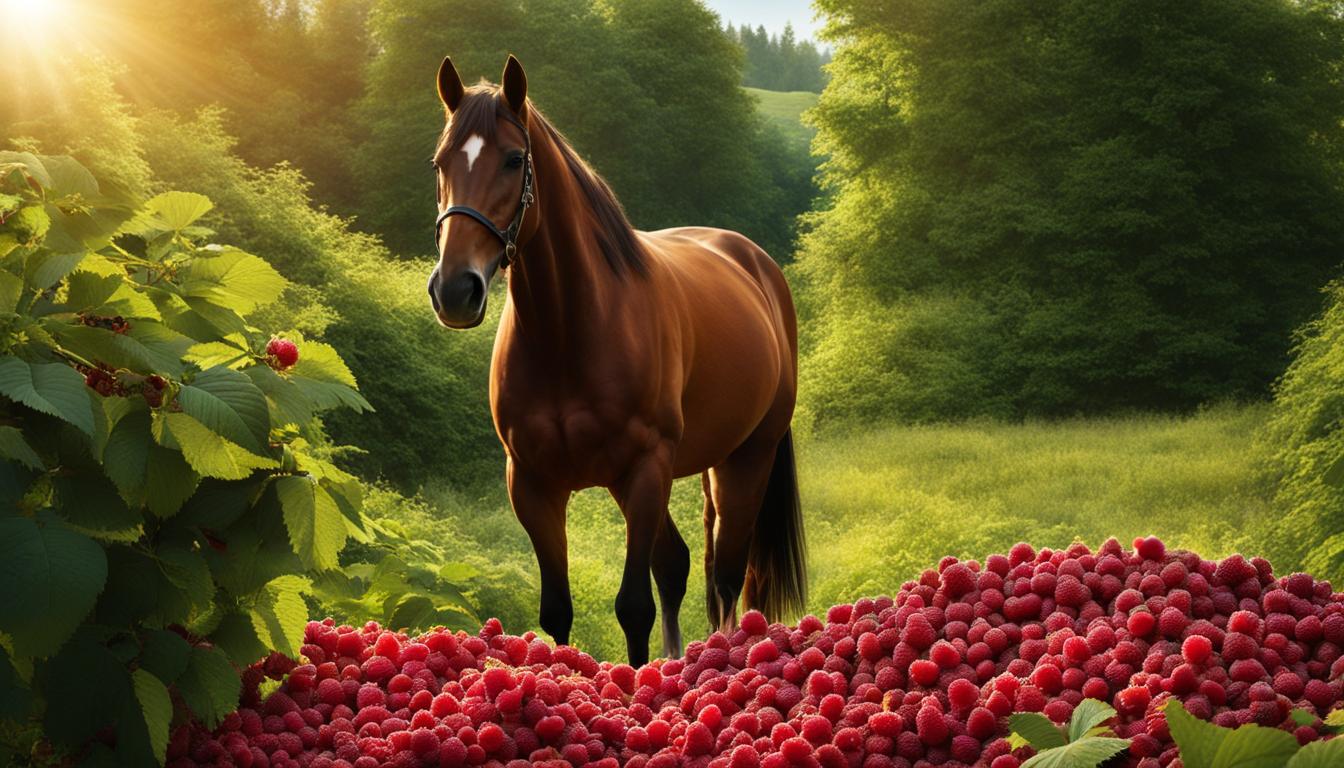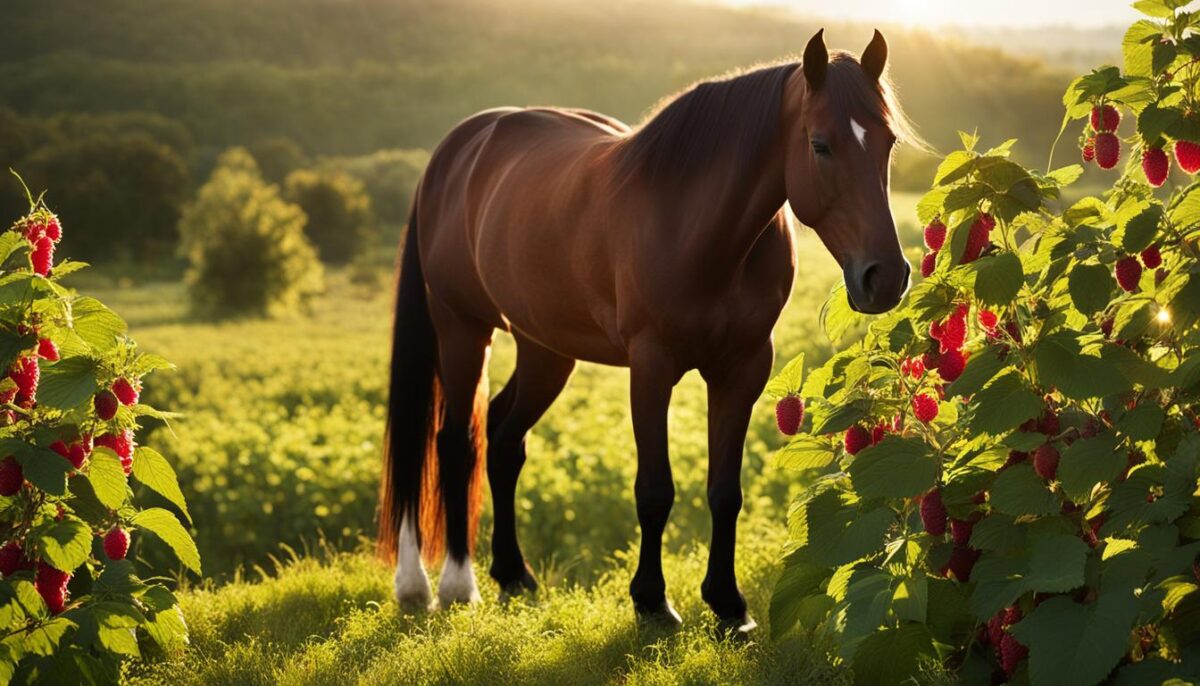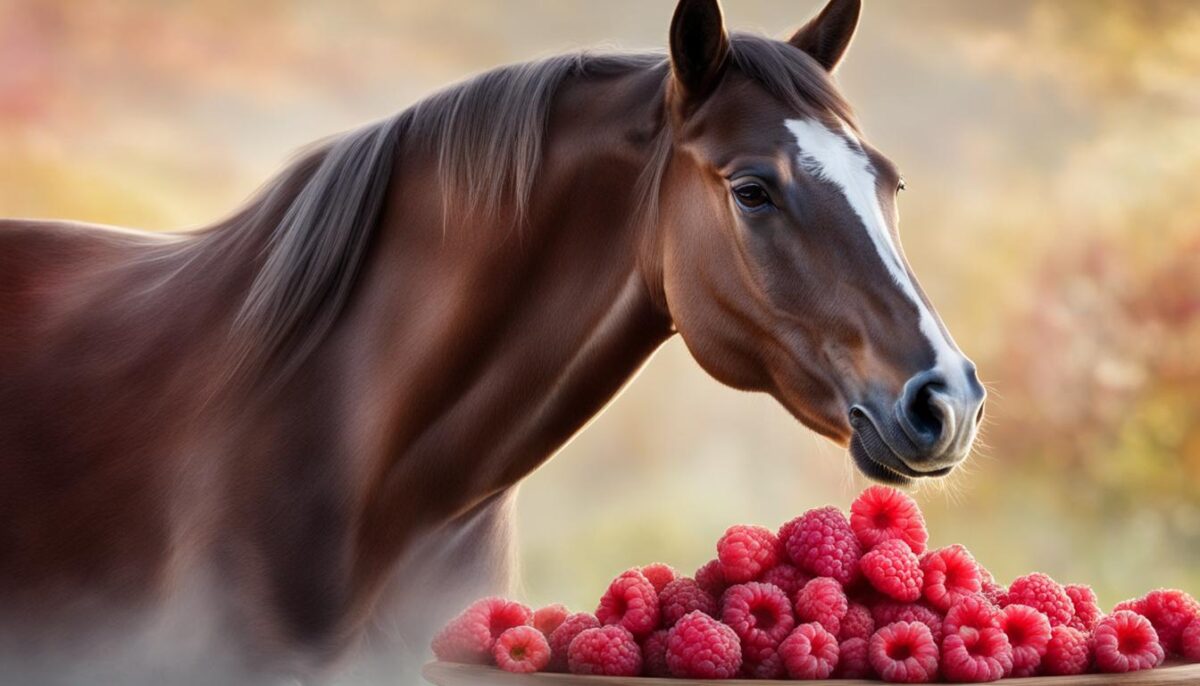When it comes to equine nutrition, providing a balanced and nutritious horse diet is essential for maintaining their health and well-being. While hay, grass, and grains are the main components of a horse’s diet, many horse owners wonder about incorporating fruits, including raspberry treats, as a tasty and fun addition for their equine companions. But are raspberries a safe fruit for horses? Let’s find out!
Key Takeaways
- Horses can enjoy raspberries in moderation
- Rich in vitamins, fiber, and antioxidants
- Introduce raspberries gradually and observe for any reactions
- Too much sugar can lead to health problems in horses
- Always consult your veterinarian for dietary guidance
- Raspberries can be occasional treats, not a mainstay in equine diets
Introduction to Equine Diets and Treats
Understanding the various elements of a horse’s diet is crucial for maintaining their overall health and well-being. This section will delve into the basics of equine nutrition, highlighting the importance of moderation when introducing treats into your horse’s meal plan.
Understanding the Basics of a Horse’s Diet
Horses are herbivores, relying primarily on plant-based foods for their sustenance. Hay, grass, and grains are the fundamental components of an equine diet, providing them with sufficient nutrients, vitamins, and minerals. Within a balanced diet, horses also need to consume an adequate amount of roughage or dietary fiber to promote proper digestion and support their digestive system.
The Role of Treats in a Healthy Equine Diet
While the core components of a horse’s diet should focus on hay, grass, and grains, introducing occasional treats can add variety and enhance their eating experience. Treats, such as fruits and vegetables, should be given in moderation and must never replace the essential elements of their diet, like roughage.
Incorporating small amounts of treats like raspberries into their diet can bring both dietary and mental benefits to your horse without compromising their health. Horse treats can serve various purposes, like rewards for training, relationship and trust building, or simply adding more pleasure to your horse’s day-to-day life. Despite the potential benefits, it is essential to exercise caution and practice responsible horse feeding practices when giving any treats, as excessive indulgence can lead to unintended health issues.
“Everything in moderation, including moderation”
- Hay, grass, and grains are the primary components of an equine diet
- Horses require sufficient roughage for proper digestion
- Treats can benefit horses in terms of variety and pleasure but should be given in moderation
- Responsible horse feeding practices help avoid health issues and maintain holistic well-being
What to Know About Raspberries and Horses
Feeding raspberries for horses can be a fun and delicious treat, but it’s important to understand their nutritional content and suitability for equines. Raspberries, like other fruits, are a natural source of vitamins and minerals that can support a horse’s overall health. Nevertheless, moderation is key when feeding horses fruit.
Raspberries are rich in vitamins C and K, as well as minerals such as potassium and magnesium. However, they also have a high natural sugar content, which needs careful consideration when offering them to your horse. Horses primarily rely on hay, grass, and grains for their nutritional needs, while fruits like raspberries should be given as occasional treats to maintain a balanced diet.
When introducing raspberries or any horse-friendly fruits into your horse’s meal plan, it’s essential to keep portions small and gradually increase them over time. Start by offering a few berries and observe how your horse reacts to this new treat. Remember, always consult with your veterinarian before making any significant changes to your horse’s diet.
In addition to raspberries, there are several other fruits that horses can safely enjoy, such as apples, bananas, and other types of berries. When offering fruits to your equine friend, it’s crucial to adhere to the same concept of moderation, as too much can disturb their digestive system.
Keep a close eye on your horse when you introduce any new type of fruit and consult your veterinarian with any concerns to ensure your horse stays healthy and happy.
In conclusion, raspberries can be a nutritious treat for horses when offered in moderation. As horse owners, it’s essential to be aware of the nutritional content and potential benefits of fruits like raspberries, and how to properly incorporate them into a horse’s diet. By doing so, you can provide an occasional tasty surprise without compromising your horse’s health and well-being.
Health Benefits of Raspberries for Horses
Feeding your horse raspberries can provide a variety of health benefits due to the multitude of raspberry nutrients available in these delicious fruits. Improving a horse’s health is a top priority for any owner, and raspberries are packed with vitamins and minerals that your equine friend may benefit from.
Vitamins C and K, magnesium, potassium, and dietary fiber are some of the essential nutrients found in raspberries. These nutrients work together to:
- Support hoof health
- Boost the immune system
- Promote digestion
- Improve overall well-being
Furthermore, raspberries also contain antioxidant benefits that assist in strengthening your horse’s immune system and reducing inflammation in the body. This is particularly beneficial for performance horses and those recovering from illnesses.
Despite these advantages, it’s crucial to remember that the portion size and feeding frequency of raspberries should be carefully monitored. Just like any treat, moderation is key. It’s essential not to overfeed raspberries to your horse, as their natural sugar content can cause health issues if consumed in excessive amounts.
In conclusion, raspberries can certainly contribute to a healthier and happier horse. By understanding the health benefits of raspberries and utilizing them in moderation, you can effectively introduce these vitamin-rich treats as part of your horse’s diet, ultimately leading to better overall well-being for your equine companion.
Understanding the Risks: When Raspberries Aren’t a Good Choice
While raspberries can be a healthy and tasty treat for horses, there are potential risks associated with overfeeding and equine allergies. Being aware of these risks and taking caution when introducing raspberries to your horse’s diet can help prevent any horse digestion problems.
Recognizing Signs of Overfeeding
Feeding large quantities of raspberries can lead to overfeeding risks such as weight gain and health issues, due to the fruit’s natural sugar content. Additionally, the presence of mold or spoilage on raspberries can harm your horse’s digestive system. Signs of overfeeding can include:
- Weight gain
- Altered behavior
- Colic
- Diarrhea
It is essential to limit the number of raspberries and offer them as an occasional treat to minimize these risks.
Identifying Potential Allergies and Sensitivities
Some horses may have allergies or sensitivities to raspberries, which can lead to adverse reactions. Be vigilant for any abnormal signs such as:
- Hives or skin irritations
- Swelling of the lips, eyes, or face
- Respiratory distress
- Unusual behavior or discomfort
If you observe any of these symptoms, it is important to discontinue feeding raspberries to your horse and consult with a veterinarian for further guidance.
By understanding the possible risks associated with feeding raspberries to horses and taking necessary precautions, you can safely incorporate this tasty treat into your horse’s diet while maintaining their health and well-being.
How to Introduce Raspberries into a Horse’s Diet
Introducing new foods, like raspberries, to your horse’s diet requires a careful approach to ensure their health and safety. It is important to consider various factors such as your horse’s size, activity level, and overall health. To help you get started on adding raspberries to your horse’s diet, follow the steps below:
Starting with Small Portions
When first giving raspberries to your horse, begin with a small amount, such as two or three berries, to gauge their reaction. Gradually increase the quantity over time while keeping an eye on your horse’s response. Remember to wash raspberries thoroughly before feeding them to your horse to remove any dirt or pesticides.
Monitoring Your Horse’s Health and Behavior
As you introduce raspberries into your horse’s diet, be proactive in monitoring their health and behavior for any signs of digestive issues or adverse reactions. Keep an eye out for symptoms like colic, diarrhea, or changes in behavior, which could indicate a problem. If you notice any of these signs, it is best to consult with your veterinarian and consider discontinuing the raspberries.
Incorporating raspberries in your horse’s diet is a tasty way to provide additional nutrients to their diet. By following these guidelines on introducing new foods to horses, making equine dietary changes, and ensuring proper health monitoring, you can safely add raspberries to your horse’s list of favorite treats.
Can Horses Eat Raspberries Safely? Guidelines for Owners
Horses can indeed enjoy raspberries as a delicious, nutrient-rich treat when fed properly. To help ensure the safety and health of your equine friend, it’s essential to follow appropriate horse nutrition guidelines for feeding raspberries and other safe fruit treats. In this section, we will discuss the frequency and quantity of raspberry treats, along with alternative fruits that are suitable for horses.
Frequency and Quantity of Raspberries as Treats
When feeding raspberries to your horse, moderation is key. Limit raspberry treats to a small quantity, preferably no more than 6 to 8 berries at a time. Remember that raspberries should be considered as occasional treats and not a mainstay of their diet. Overfeeding raspberries could cause health issues related to their sugar content, so it’s essential to monitor your horse’s consumption to prevent potential problems.
Alternative Fruits Safe for Equines
If you’re looking to introduce more variety in your horse’s treat selection, there are several other fruits you can consider. Here’s a list of alternative safe fruit treats for horses:
- Apples
- Carrots
- Strawberries
- Blueberries
- Watermelon
- Bananas
- Pears
Be mindful when offering these fruits to your horse. Always cut them into smaller, bite-sized pieces to prevent choking. Moreover, avoid fruits with pits or stones, as these can pose a choking hazard or cause digestive issues. It’s also crucial to remain vigilant about potential risks associated with certain fruits and vegetables, particularly those from the nightshade family that can be toxic to horses.
In conclusion, horses can safely eat raspberries and other fruits when given the proper portions and offered occasionally. By following these guidelines, you can ensure your horse receives a variety of enjoyable treats without compromising their health and well-being.
Conclusion
In summary, horses can safely enjoy raspberries as treats when given in appropriate portions following the equine treat guidelines. It is crucial to consult a veterinarian before incorporating fruits like raspberries into your horse’s diet. Always consider the individual health needs of your horses when offering new foods.
Remember, raspberries can be a delightful addition to a horse’s diet, but roughage is fundamentally essential to a horse’s health, and treat foods must remain supplementary. Monitor raspberry portions for horses and limit their frequency to ensure a balanced and optimal horse diet.
Maintaining an open line of communication with your veterinarian, along with careful observation of your horse’s health and behavior, will help you make the best decisions regarding raspberry treats and other fruits for your equine companions.
FAQ
Can horses eat raspberries?
Yes, horses can eat raspberries, but they should be given in moderation due to their sugar content. Raspberries can be a healthy and tasty treat for horses when incorporated into their diet responsibly.
What are the nutritional benefits of raspberries for horses?
Raspberries contain essential nutrients such as vitamins C and K, magnesium, potassium, and dietary fiber. These nutrients support hoof health, immune system function, digestion, and overall well-being in horses. Raspberries also have antioxidant properties that could offer immune and anti-inflammatory benefits.
How should I introduce raspberries into my horse’s diet?
Introduce raspberries slowly, starting with a small number of berries and gradually increase the amount while monitoring your horse’s response. Clean raspberries thoroughly before giving them to your horse, and offer them as part of a varied, balanced diet. Monitor your horse’s health and behavior closely to catch any signs of digestive problems or adverse reactions early.
What are the risks of overfeeding raspberries to my horse?
Overfeeding raspberries can lead to digestive health issues such as colic or diarrhea, as well as weight gain and other health problems due to the fruit’s natural sugars. Owners should also be aware of mold or spoilage on raspberries and discontinue feeding them if any adverse reactions or allergies occur.
How much and how often should I give my horse raspberries?
Limit raspberry treats to small quantities and consider giving them as occasional treats rather than a regular part of your horse’s diet. Consult with your veterinarian to determine the most appropriate portion size and frequency based on your horse’s individual health needs and dietary requirements.
What other fruits are safe for horses?
In addition to raspberries, other safe fruit options for horses include apples, carrots, and various berries. Be sure to cut up fruits to prevent choking and avoid feeding pitted fruits. Always consult with your veterinarian before introducing any new foods to your horse’s diet.


